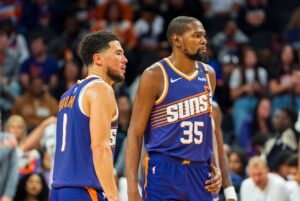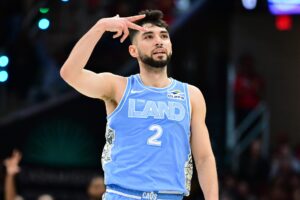The old saying that “history repeats itself” cannot be more prevalent than this unique postseason in the bubble.
After defeating the Portland Trailblazers and Houston Rockets in five games, a third time was still a charm for the Los Angeles Lakers. They defeated the red hot Denver Nuggets in five games after losing 114-106 in Game 3. Denver came off a shocking 3-1 comeback against the Los Angeles Clippers, who was a popular pick to make the NBA Finals.
Similar to the Western Conference Semifinals, the Lakers had under a week of rest to prepare for the Nuggets. While Denver showed no signs of fatigue, the Lakers demonstrated why they’re a finals contender: quick adjustments to opponents.
Western Conference Finals Recap: Los Angeles Lakers vs. Denver Nuggets
Los Angeles Lakers’ Success
The Lakers were the favorite heading into the Western Conference Finals, but it was no easy matchup. Denver was coming off two consecutive 3-1 deficits and were determined to make it three in a row by beating the No.1 seed. One of the Lakers’ weaknesses is their inability to quickly adjust to opponents’ game plans. This has not been the case in the postseason, especially the Western Conference Finals. The main turning point of the series was the game-winning three-pointer from Anthony Davis as time expired in Game 2.
A big question for the Lakers was if they were quick enough to slow down the surging Jamal Murray and top center Nikola Jokić. Another concern was if they were able to rotate quickly on defense to throw off the Nuggets. Jokić is the anchor of the Nuggets’ offense due to his passing abilities and excellent basketball IQ, so it was crucial to slow him down. The Lakers average 5.6 blocks (1st among postseason teams) and 8.5 steals per game due to their closeout abilities and solid defensive rotations. LeBron James played a huge part on defense by shutting down Murray in the final five minutes of Game 4 and 5.
Offensively, the Lakers thrived from fast break opportunities and shooting in the paint. 13.8 percent of their points come from fast breaks, the second-most in the postseason. They are also second in points in the paint, averaging 49.6 per game. The Lakers quickly adjusted to small-ball lineups in the latter half of the series, when the Nuggets utilized Monte Morris, Jerami Grant and Michael Porter Jr. to accommodate Murray’s speed and playmaking.
Denver Nuggets’ Struggles
During the Clippers series, Jokić averaged 24.4 points, 13.4 rebounds, and 6.6 assists off 51.5 percent shooting from the field. His success highlighted the Clippers’ weakness in defending taller players. They did not have the staff to guard Jokić. However, the Lakers’ length played a part in his struggles. For example, Dwight Howard gave Jokić problems on offense due to his size and strength. While both teams struggled with consistent foul calls from the officials, the Nuggets showed why they were more affected: their youth. When the Nuggets did not get their ways, they grew frustrated, which allowed Laker veterans such as Howard to play more aggressively on defense and get into their heads. That is a common basketball technique utilized by veterans and it paid off. In addition, Howard’s aggressiveness got Jokić into foul trouble, which disrupted the Nuggets’ game plan.
The Nuggets shot well from the field but did not shoot above 38 percent from behind the arc. This allowed the Lakers to excel in rebounding, as they averaged 37.4 rebounds per game during the series. Los Angeles has struggled with shooting throughout the season but shot over 50 percent from the field against the Nuggets.
This was due to their success in transition and outlet passing. Denver did a nice job cutting the Lakers’ lead to within five points or even take the lead, but could not finish the games strong due to coach Frank Vogel’s rotations and game plan adjustments. Foul trouble kept Jokić, Paul Millsap and Gary Harris off the floor. This forced Murray to exert more energy against a touch Lakers’ defense. This led to a leg injury in Game 5, slowing his play down and ultimately losing the series despite a solid effort and killer mentality.
Top Performers in the Western Conference Finals
Once again, the Lakers’ defense is the MVP of the series due to limiting the damage from Murray and Jokić. Solid defense does not necessarily mean that one shuts a player or team down, but making their jobs harder. The Lakers did that against the hottest player in the bubble and arguably the best center in the league. Their coaching staff also excelled in implementing quick changes against the younger Nuggets by utilizing their veterans more in this series. It paid off.
Individually, Davis earns the notch this series as he finished averaging 31.2 points, 6.2 rebounds, and 2.6 assists while shooting 54.3 percent from the field.
Denver’s best player is Murray, who averaged 25 points, 4.4 rebounds, and 7.4 assists while shooting 51.8 percent from the field and 31 percent behind the arc.
Up Next for the Los Angeles Lakers
The Lakers advance to their 32nd Finals appearance in franchise history and their first since 2010. They will face the Miami Heat, who are coming off a Game 6 victory over the Boston Celtics. Head Coach Erik Spoelstra will face James, who won two titles with the Heat under him.
Game 1 of the NBA Finals will begin on Wednesday, September 30th at 6 P.M. PST on ABC.
Main Photo:
Embed from Getty Images






